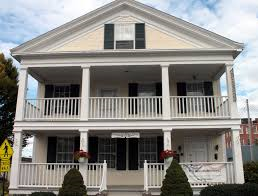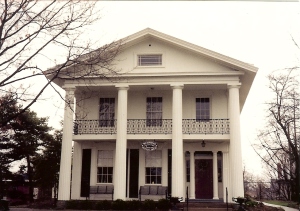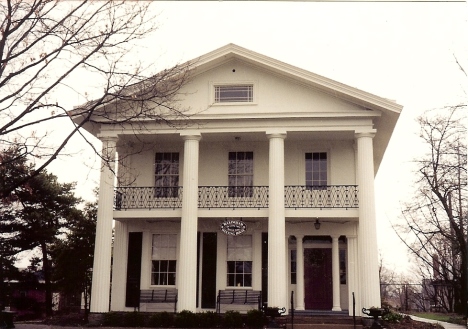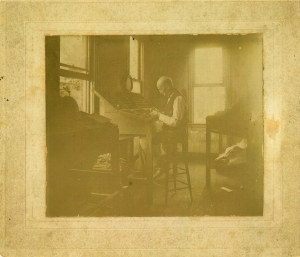Sufferers’ Land
End of an Era
by Dave Barton
From the time he established The Huron Reflector in 1830, Lucy Wickham’s father Samuel Preston had been senior proprietor and publisher of the paper. Possessing a vigorous constitution, he continued to work at the printing trade daily.

The Preston-Wickham home is now the Firelands Historical Museum. On a visit to the museum several years ago, I noted that the staircase where Samuel Preston had his fatal fall is steep and narrow, with a tight turn at the landing. My late father, in his youth, was pallbearer for the last Wickham resident of the home. He once told me that they almost dropped the casket while navigating it down those stairs.
On Wednesday, March 3, 1852, he was setting type in the pressroom on the second floor of the Wickham home. Finished with his work, he headed downstairs and suddenly fainted and fell, striking his head violently on the floor. He fractured his skull and died soon afterwards. It is probable that his fainting spell was the result of alcohol. Samuel was a heavy drinker, and it is likely he had a bottle for company that day. [1]
The death of another early pioneer came several months later. Sally DeForest Benedict died on Thursday, June 24, 1852 in her home. She had come to Norwalk in 1817 with her husband Platt Benedict, and with him had been a leader in the community. Platt grieved at her passing, and so did the rest of the village. Everyone remembered her as a good, religious woman.
Mrs. Gardiner, a friend of Sally, said of her, she was one of the first settlers in Norwalk and one of the sound women who came here at that early day. She was a very domestic woman; attended well to her household; a good wife and mother; a true friend; a help to all in time of need, a lover of her home and her church. When her strength would not permit her to walk to the two services (Episcopal), one in the forenoon, and the other, after a short intermission, she would take her lunch and remain in the church. She said to me, ‘I love to be here; there is no place that suits me as well.’ [2]
Sally joined a long line of original settlers of the Firelands who had passed on. The mantle of responsibility had already passed to their children. Now their grandchildren were growing up in the village.
The lives of these grandchildren were much different from the rough frontier lives of their parents and grandparents. Some of the old settlers considered them soft. However, they were growing into men and women who would soon face a terrible challenge, a challenge they would meet with the same courage their parents and grandparents had shown in conquering the frontier.
Footnotes:
[1] From the obituary of Samuel Preston, The Firelands Pioneer, New Series, Volume XX; The Firelands Historical Society; December 1918; pp. 2187-8.
[2] “Ancient Dames of Norwalk,” by Charlotte Wooster Boalt, The Firelands Pioneer, New Series, Volume XX; The Firelands Historical Society; December 1918, p. 1998.
#
This post was first published on this blog in 2009.
#
Previous Post: The Wickham Family in the 1850’s
Next Post: Norwalk, Ohio Life in the 1850’s
#
Thanks for visiting! Share and like this post below, and on Facebook. Let me know what you think in the comments. I’d love to hear from you!
Filed under: Benedict, DeForest, Episcopal Church, Norwalk, Ohio, Ohio, Preston, Uncategorized, Wickham | Tagged: Benedict Genealogy, Firelands Historical Society, Firelands History, Firelands Museum Norwalk Ohio, Norwalk Ohio History, Ohio History, Preston Genealogy, Sally DeForest Benedict, Samuel Preston, Sufferers' Land History, Wickham Genealogy | 1 Comment »




